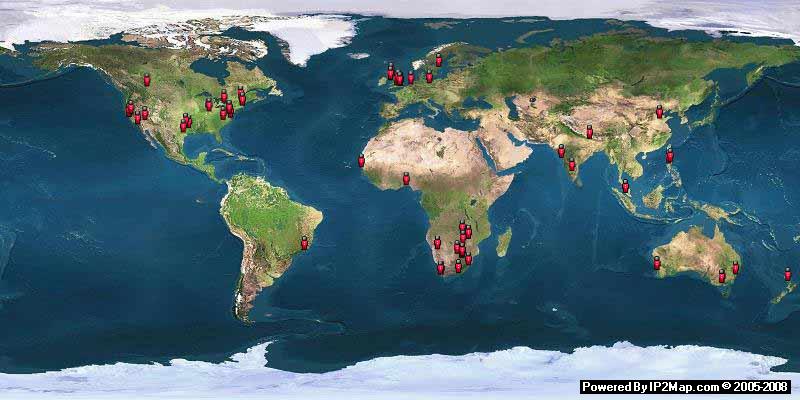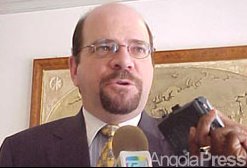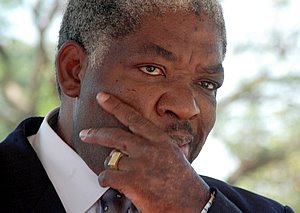| Will Mbeki rise to the challenge this time around? |
| By Geoffrey Nyarota AS Zimbabweans approach the nation's 27th independence anniversary next week there appears to be little reason or prospect for genuine and spirited celebration of that day back in 1980, which should have brought an end to to almost a century of subjugation, oppression, discrimination and humiliation of the majority of the population under colonial rule. Today Zimbabwe's clock of freedom, independence, democracy and human rights has gone a full circle. Millions of citizens once more yearn for freedom from oppression by the government which they elected to power in that distant past. Details of the devastating crisis which has brought Zimbabwe to its knees are well documented, with new twists and tragic turns emerging every day. The extraordinary summit of Sadc heads of state in Dar es Salaam a fortnight ago presented what is fast appearing to have been an illusive or premature cause for optimism. Developments since then, however, have not been conducive to genuine celebration next April 18. Once back in Harare, on his return from the Tanzanian capital, the utterances of President Robert Mugabe confounded all, while dashing any hopes that the conference might have finally produced the prescription for a lasting solution to the crisis that has bedeviled our country over the past eight years. Tanzanian President Jakaya Kikwete convened the summit at the height of renewed political violence which witnessed the brutally vicious assault of opposition leaders, civil society activists and journalists. The world was unanimous in its condemnation of this scourge of bloodletting. The impression was created that Mugabe's peers, the Sadc leaders in particular, their collective conscience finally pricked, had at last been prodded into action. Departing from normal presidential practice in the region, Zambian head of state, Levy Mwanawasa, did not mince his words in condemning the state-sponsored aggression in Zimbabwe. He likened the country to a sinking Titanic. Tough words coming from an African head of state and a most appropriate backdrop for the Dar es Salaam summit. Hopes were ignited that the Sadc leadership was at last ready to assume its responsibilities in reining in their counterpart in Harare. But, back in Harare, a swaggering Mugabe boasted to members of his party's central committee that notwithstanding the content of the communiqué, the Sadc leaders had given him full backing in a closed meeting. "President Mbeki said that Western countries wanted to remove leaders of liberation movement parties and replace them with puppets," Mugabe said. "President Mbeki said if we allow Western countries to do this to Zimbabwe, then we are all finished." Mugabe even boasted as he revealed to the cheering party faithful that he had graphically explained to the Sadc leaders how thoroughly MDC leader Morgan Tsvangirai was assaulted. Warming up to the show of support, Mugabe shamefully mocked Tsvangirai. The response from Mbeki's office on these incriminating and extremely outrageous allegations was feeble. The Star newspaper of Johannesburg quoted an unidentified South African official who was present at the summit as has having denied Mugabe's account of events. The official said that, contrary to Mugabe's assertions, the Sadc leaders had told him that the torture of political opponents could not continue. The official who was the source of this denial did not attend the meeting. The implication of this is that of all the heads of state who attended the meeting, only Mugabe has so far commented on the deliberations. There has been a deafening silence from the rest of his colleagues including, strangely, the previously trail-blazing Mwanawasa. No doubt, behind closed doors in Dar es Salaam, his colleagues whispered a word in his ear about protocol and the need to defend Africa against the evil machinations of neo-colonialism. This would not be surprising given that the Sadc leaders effectively publicly rallied behind Mugabe when they called on western nations to lift sanctions against Zimbabwe and on Great Britain to honour its commitment to finance the acquisition of commercial farmland from white farmers. Both issues have not been elements of the current battle-cry against dictatorship in Zimbabwe. While Mbeki must be cautiously congratulated for the speed with which he now seems to be seeking to discharge his new responsibilities in terms of his mandate from Dar es Salaam, questions must still be raised at the earliest opportunity about his sincerity as he embarks on the new initiative. To strengthen his credentials as a bona fide Zimbabwean peace-maker he needs, of necessity, to issue an unequivocal statement on the orgy of violence that was publicly condoned by his opposite number in Harare. On the basis of his previous performance, his policy of "quiet diplomacy" especially, and endorsement of electoral processes that were widely condemned, many regard Mbeki as being effectively imbedded with the Mugabe regime. To convince a skeptical Zimbabwean public about the sincerity of his approach to the new initiative or task, it behoves the South African President to explain where he believes his previous initiatives in addressing the Zimbabwe crisis were inadequate. That way there will be no room left for doubt that he fully understands and appreciates the exact nature and magnitude of the task ahead. It is worrying in that context that, in the first instance, Mbeki is said to be keen to unite the MDC. To this end he is reported to have swung into action by inviting Tendai Biti, the secretary general of the mainstream MDC and Welshman Ncube, his counterpart in the breakaway faction of the party. Unity between the two factions is, indeed, a sine qua non of the campaign against the dictatorship of the ruling Zanu-PF clique. But the process to unite the two factions was already underway before the Dar es Salaam summit and credit for its achievement could now easily be misappropriated. Arthur Mutambara, to his credit, has made a number of overtures and statements in this regard. The re-unification of the MDC, assuming the split was ever more than skin deep, is not currently the major concern of the beleaguered nation of Zimbabwe. It was already spontaneously taking place under its own steam. Unless, of course, Mbeki views himself as the only party competently qualified to prescribe the nature and context of the re-unification. His known pr edilection with Ncube, the intellectual and apparent contempt of Tsvangirai, the trade unionist, who is perceived as an ally of the Congress of South African Trade Unions (COSATU) has been a factor in the failure of Mbeki's "quiet diplomacy". His personal relationship with Mugabe's man in Pretoria, Simon Khaya Moyo, is alleged by those in the know to be also part of his problem. Mbeki must adopt a very strong position against lawlessness and government-sponsored violence. Consultation with two of the victims of the recent scourge of violence, Grace Kwinjeh and Sekai Holland, are currently receiving treatment in Johannesburg, would be instructive in this regard. Mbeki's new strategy, whatever it is, will have been dealt a serious body blow by the pronouncement last week by the United States administration on the extent of its assistance to Zimbabwe's opposition movement. The Americans will argue at the semantic level. They will say they were speaking on the need for a level political playing field; the necessity for open and fair political competition, the need for transparency and accountability of the party of government, all important values in any democratic dispensation. They will say the message they sought to convey was that the people of Zimbabwe need to know that there are people outside Zimbabwe that care about their future. This is perfectly understandable and all commendable in the view of ordinary citizens. But, unfortunately, the message that Mugabe and his henchmen will have chosen to understand is simple. It is that the George Bush administration has finally admitted that it is actively engaging in regime-change strategies in Zimbabwe – by plotting to remove him from office through underhand or undemocratic means. The opposition will suffer the consequences of Mugabe's retribution. Given the content of the communiqué in Dar es Salaam, African leaders will share Mugabe's concerns. From a different perspective, there is a real threat to any gains that the opposition movement made through the widely publicized onslaught on opposition leaders by state security agents. Alternatively, those critics of Mugabe who are not sponsored by the US government will now be lumped together by Mugabe and his henchmen and portrayed in their propaganda as mouthpieces or puppets of Washington. Outside Mugabe's immediate circle this should be of little consequence, but Information Minister, Sikhanyiso Ndlovu, has since made sinister remarks about opposition websites and newspapers that are sponsored by the Americans. With an election a year away this apparent confirmation could become useful ammunition for Ndlovu's first attempt at a propaganda blitz. Unfortunately, there are many in Zimbabwe who still believe information reaching them through government's media empire, especially in the absence of alternative sources. Send your comments to: letters@thezimbabwetimes.com |
Yahoo! Answers - Got a question? Someone out there knows the answer. Try it now.











No comments:
Post a Comment